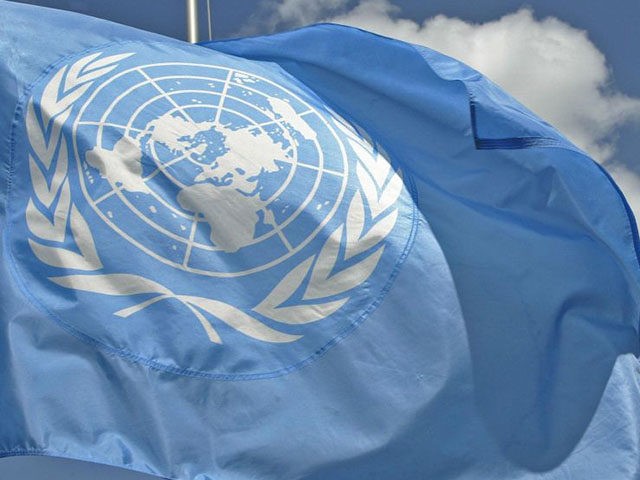United Nations Secretary-General Antonio Guterres applauded his organization in a report made public on Tuesday for taking “robust measures” against its own deplorable record of sexual abuse, including “mandatory training” and “annual surveys.”
The U.N. made public Guterres’ annual report on its own rape, sexual exploitation, and other sexual abuse on Tuesday, which revealed a significant spike in the number of allegations of sexual abuse by U.N. staffers.
“According to the report, 445 allegations were received in 2021, representing an increase over the 387 received in 2020, and the highest number recorded since 2016, when 165 allegations were made,” the U.N. admitted.
The organization elaborated:
Of the 2021 total, 194 reports were received system-wide, with 75 allegations related to peacekeeping, up from 66 in 2020, and above the average recorded over the last 10 years.
There were 115 related to UN entities, up from 109 in 2020, and 4 involving formerly deployed non-UN security forces. In addition, 251 allegations involved non-UN related entities , such as non-governmental organizations, an uptick from 244 in 2020 and 174 in 2019.
Accusations of sexual assault and exploitation of victims of war or humanitarian disaster run rampant among U.N. agencies. Even its most prestigious institutions – such as UNICEF, the World Health Organization (W.H.O.), and the International Organization for Migration (IOM) – have faced accusations of widespread violations, including demanding that recipients of humanitarian aid engage in sex with U.N. workers in exchange for food, as well as sexual harassment and other abuses. Many of these incidents have allegedly occurred in Africa, including against victims of the Ebola outbreak in the Democratic Republic of Congo in 2018.
Guterres’s report congratulated the United Nations for its bureaucratic responses to the alleged abuses even as the U.N. documented more such allegations.
“Over the past five years, we have strengthened policies and protocols, introduced mandatory training, conducted risk assessments, institutionalized action plans and senior leaders’ management letters,” Guterres wrote, “engaged staff through annual surveys, publicly reported on the status of all allegations, proceeded with the separation or dismissal of staff with substantiated allegations and, where warranted, repatriated alleged perpetrators, including military contingents.”
Guterres noted positively that the W.H.O. responded to the Congo scandal – in which its doctors were accused of demanding sex from local health workers in exchange for jobs and naming Director-General Tedros Adhanom Ghebreyesus when boasting of their power to pressure women into sex – by “establishing an independent commission in 2020.”
“We must strengthen our leadership and organizational culture of gender equality and intolerance of sexual misconduct, create a global framework for cooperation with States on prevention and enhance our engagement with and support to communities, especially women’s groups and grass-roots actors,” the report concluded.
In a press conference announcing the release of the report, Guterres’s spokesman Farhan Haq lamented, “no one, including the Secretary-General, is pleased with the fact that we still have these cases.”
Guterres began his bureaucratic approach to pervasive sexual abuse by the U.N. in 2017, establishing task forces, working groups, and special offices to address victim relations. Prior to that, U.N. officials had documented extensive evidence of sexual abuse by peacekeepers in Congo (independent of the later W.H.O. scandal) and the Central African Republic in 2016. An independent report also accused U.N. peacekeepers of rampant sexual abuse of minors as young as nine in the latter country.
Elsewhere, accusations of “sex for food” scandals in which United Nations affiliates used their access to humanitarian aid to demand sex from impoverished civilians erupted in Syria and Haiti.
Haq described the situation in the Central African Republic as a place where the United Nations could point to “clear gains” on the issue.
“As you know, in 2021, allegations relating to U.N. peacekeeping personnel in the Central African Republic led to the repatriation of a military contingent,” Haq said on Tuesday.
In 2018, Andrew MacLeod, former chief of operations at the U.N.’s Emergency Co-ordination Centre, estimated publicly that the U.N. was cataloging only one in ten sexual assault cases attributed to them, as these are the ones reported. If true, that tally would result in about 60,000 sexual abuse cases by the U.N. in ten years, according to the Times of London.
That same year, the U.K. Guardian published a report accusing U.N. staffers of rampant sexual harassment and abuses against other U.N. employees, including an alleged rape. Anonymous individuals who spoke to the Guardian reported widespread impunity for sexual abuse in the workplace.
“Even when you summon your courage to complain and you exhaust all the internal mechanisms like I did, all the resources, all the processes, there’s nothing for you,” one woman said. “They mobilize friends, colleagues against you. I had threats, sent through friends, that ‘She will never set foot in this office again.'”

COMMENTS
Please let us know if you're having issues with commenting.